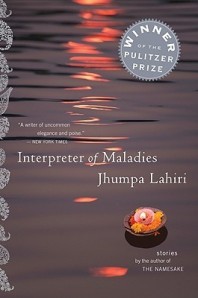 Jhumpa Lahiri has won or been nominated for almost every prestigious literary award imaginable. And I haven’t read either of her two novels. I think I almost purposefully avoid award winners. Why do I do this? I think I tend to be disappointed when they don’t live up to this idea in my head of what an award winner should be. But I’m happy to say that Interpreter of Maladies deserved its Pulitzer.
Jhumpa Lahiri has won or been nominated for almost every prestigious literary award imaginable. And I haven’t read either of her two novels. I think I almost purposefully avoid award winners. Why do I do this? I think I tend to be disappointed when they don’t live up to this idea in my head of what an award winner should be. But I’m happy to say that Interpreter of Maladies deserved its Pulitzer.
It’s a collection of nine short stories focusing on Indian and Bengali characters both in India and in the States. You get nine brief glimpses into the lives of some beautifully rendered people having honest struggles. Many of those struggles revolve around marriage and relationships which is universal around the globe. You get realistic portrayals of what it feels like to be a foreigner in many different scenarios. You get a little bit of history, a lot of culture, and one of the best short story collections published in the last decade.
I read these stories in one sitting while the snow fell in Atlanta and everyone else seemed to be trapped in their vehicles. With the fire warming my toes, I literally could not stop reading long enough to care about those stranded commuters which included my husband. Maybe this makes me a terrible person or perhaps this makes Jhumpa Lahiri a magician or a wizard. Either way, I won the great snowpocalypse of 2014.
None of these stories are super joyful. In fact, most of them are downers. I had to take a couple of moments after each conclusion to mourn whatever needed mourning before I could continue. But I always continued. The pull of Lahiri’s writing was too much to resist no matter how gut-wrenching or desolate the stories read. What often irritates me about short story collections is how unfinished each snippet can be – how each story ends just as soon as you finally feel pulled in. Interpreter of Maladies didn’t have this flaw. I felt like I had gotten to know a complete story – or at least all I needed to know for the moment – at each story’s end. Utter perfection.
By now, you can clearly tell this was a no-brainer five star book for me. The Pulitzer people knew what they were doing with this selection. Now it’s your turn to pick it up for the first time or to reread and discover the magic all over again.
One of my friends recently recommended Lahiri’s books to me. After reading this, I definitely intend to check her out! Thanks for the post.
I was super impressed and hope you enjoy her writing just as much as I did!
Yes. I enjoyed this collection and her writing too. I also liked her book the Namesake and Unaccustomed Earth. They’re all good. I havent read The Lowland yet. But I’m convinced by now she’s a magician with words
Yay for all the Lahiri fans! She’s masterful at her craft, for sure.
I am ashamed to say that I have owned this for years without reading it. I really need to change that…
Yeah you do! It’s a super quick read if that helps you get to it sooner.
Even though this was good, I’m not likely to pick up a book that has a lot of sad stories in it. I’m glad you enjoyed it though and that it lived up to your expectations 🙂 I’d recommend The Emperor of All Maladies if you’re looking for other good Pulitzer Prize winners. The writing was so, so good!
Maladies had its sad-ish moments but it wasn’t overwhelmingly sad. More like honest. As for The Emperor of All Maladies, I’m scared to read that book because cancer terrifies me.
LOVE this book. And I love this line: I won the great snowpocalypse of 2014.
BECAUSE I DID. I won!!
I need to pick this one up again. I was reading the very first story in the book while I was sitting in the doctor’s office waiting to learn whether I was having a miscarriage (I was) and the first story dealing with that was enough for me to put the book down! Did she write The Namesake? I did read that one and thought it was OK. I do tend to gravitate towards award winners but sometimes I wonder what the heck those judges were thinking! (I’m looking at you Shipping News).
I can understand why you initially put the book down. I would have as well. She did write The Namesake which I know a lot of people love, but it has never seemed like my kind of book. I wish judges would release some sort of thinking process or algorithm to their madness. Or even a detailed essay written about the winner and why it won.